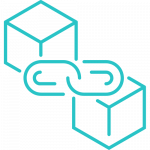
What is blockchain technology?
Blockchain is a shared and immutable ledger that facilitates the process of recording transactions and tracking assets on a business network. An asset can be tangible (a house, a car, cash, land) or intangible (intellectual property, patents, copyrights, trademarks). Virtually anything of value can be tracked and traded on a blockchain network, reducing risk and costs for all parties involved.
To understand how this technology works, it’s important to consider that it is composed of a chain of blocks. Each block contains information about a specific transaction and is linked together. This connection allows for data transfers between them, but security is total, as each block has cryptographic encoding. Its structure is similar to that of a large ledger. An important aspect of Blockchain is that no information can be deleted. The reason is that the blocks are interconnected, and to delete content from a specific one would require modifying the previous ones. The only thing that can be done is to add new information.
Key elements of blockchain

Distributed Ledger Technology
All network participants have access to the distributed ledger and its immutable record of transactions. With this shared ledger, transactions are recorded only once, eliminating the duplication of effort typical in traditional business networks.

Immutable records
No participant can change or falsify a transaction once recorded on the shared ledger. If a transaction record includes an error, a new transaction must be added to reverse the error, but both transactions will be visible.

Smart Contracts
To speed up transactions, a set of rules, called a smart contract, is stored on the blockchain and automatically executed. A smart contract can define the conditions for corporate bond transfers, include terms of a travel insurance payout, and much more.
Businesses operate on information. The faster they get it and the more accurate it is, the better. Blockchain is ideal to obtain that information, as it provides immediate, shared, and completely transparent data stored in an immutable distributed ledger that only authorized members have access to. A blockchain network can track orders, payments, accounts, production details, and much more. Additionally, because users share a single trusted source of information, they can see all the details of a transaction from start to finish, allowing them to build greater trust and efficiency, as well as seize more opportunities.

Experts believe that blockchain can irreversibly transform not only the financial world but also many other sectors: energy companies, telecommunications, public administration, logistics, transportation, media, etc. An example of these applications is the startup winner of Open Talent 2015, Everledger, which is dedicated to detecting fraud in the market for buying and selling diamonds through decentralized traceability of ownership of the gemstone itself.
Blockchain can also help determine that a person or company is who they say they are without the need to share or circulate any personal data externally. This “proof of identity” would allow, for example, renting an apartment directly as in Airbnb or a car-sharing vehicle using a blockchain-based system as a “proof of identity validator” without the need for a rental management company to mediate or share data at any time.
Although it has not yet been fully implemented, some fixed income or equity markets have begun to use this technology. The reason is that it represents a revolution, and by ignoring it, there is a risk of losing strength compared to other competitors. Blockchain is used by cryptocurrencies, which are digital exchange currencies that have a determined value.
Sources
